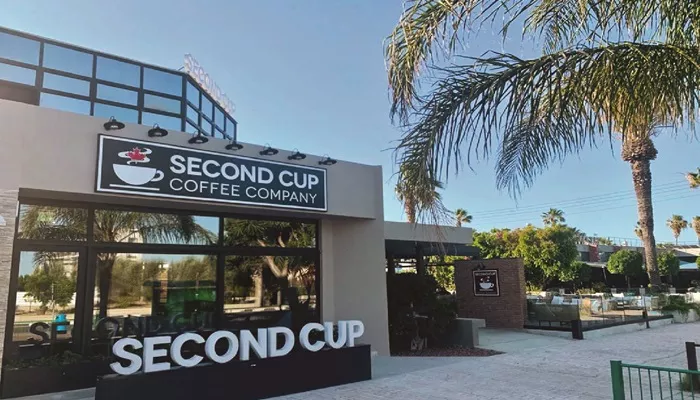Second Cup is a well-known Canadian coffee brand that has been serving customers since 1975. The brand is recognized for its commitment to quality and innovation. Second Cup serves a variety of beverages, including specialty coffees, teas, and smoothies. They also offer pastries, snacks, and sandwiches. The café environment is designed to be welcoming and comfortable, making it a popular spot for people to relax or work.
Second Cup Brand Introduction
In recent years, Second Cup has undergone significant changes to modernize its image and offerings. This includes a fresh café design and an expanded menu that reflects current consumer trends. The brand emphasizes sustainability and community involvement, which resonates with many customers today.
Second Cup started as a small kiosk in a Toronto shopping mall. The founders, Tom Culligan and Frank O’Dea, aimed to offer high-quality coffee and a unique customer experience. Over the years, the brand has evolved into Canada’s largest specialty coffee retailer, with over 300 locations across the country.
see also: Mucho Burrito Franchise
Second Cup Franchise Cost
Starting a Second Cup franchise involves several costs. Here’s a breakdown of the primary expenses:
Franchise Fee: $40,000
Total Investment: $350,000 to $500,000
This total investment includes:
- Equipment and leaseholds
- Construction and design costs
- Training expenses (including a trip to Costa Rica for training at $2,500)
- Working capital and funds for taxes
Franchisees must have at least 30% of the total investment in cash available before starting the process.
Ongoing Costs
In addition to the initial investment, franchisees must also consider ongoing costs:
Royalties: 7.5% to 9% of gross sales (lower rates apply with operational excellence)
Marketing Fees: 2% of gross sales for national cooperative marketing
These ongoing fees help maintain brand standards and support marketing efforts across all locations.
Second Cup Franchise Conditions
To become a Second Cup franchisee, applicants must meet specific conditions:
Business Experience: A proven track record in retail or restaurant management is essential.
Passion for Coffee: A genuine interest in coffee culture and customer service is crucial.
People Management Skills: Ability to hire, train, and motivate staff effectively.
Financial Commitment: Franchisees must demonstrate financial stability with sufficient capital for startup costs.
Ideal Franchise Locations
Second Cup cafés are best suited for various locations:
- Community centers
- Office towers
- College campuses
- Malls
The choice of location can significantly impact the success of the franchise.
Second Cup Franchise Process
The process of becoming a Second Cup franchisee involves several steps:
Initial Inquiry: Interested individuals should fill out an inquiry form on the Second Cup website or contact their franchising department directly.
Application Submission: After the initial inquiry, applicants must submit a formal application that includes their business experience and financial background.
Interview Process: Qualified candidates will be invited for an interview to discuss their application further.
Franchise Agreement: Once approved, candidates will sign a franchise agreement outlining the terms of the partnership.
Training Program: New franchisees must complete an intensive training program covering operations, customer service, and product knowledge.
Café Setup: After training, franchisees will work on setting up their café according to Second Cup’s design standards.
Grand Opening: Once everything is in place, franchisees can officially open their café to the public.
Throughout this process, Second Cup provides ongoing support in areas like marketing and operations to ensure franchisees succeed.
Second Cup Franchise Profit Potential
The profit potential for Second Cup franchises can vary based on several factors:
Location: High-traffic areas tend to generate more revenue.
Operational Efficiency: Effective management can lead to lower costs and higher profits.
Menu Offerings: Offering popular items can attract more customers.
Revenue Estimates
While specific revenue figures can vary widely based on location and management practices, some general estimates suggest that successful cafés can generate significant annual sales. Many franchisees report revenues ranging from $500,000 to over $1 million annually once established.
Return on Investment (ROI)
The ROI for Second Cup franchises can be attractive due to strong brand recognition and support from the franchisor.
However, it’s essential for potential franchisees to conduct thorough market research and financial planning before committing.
Conclusion
In summary, Second Cup offers an exciting opportunity for those interested in entering the coffee retail market through franchising. With its rich history, commitment to quality, and supportive franchising model, it stands out as a strong choice for aspiring business owners. By understanding the costs involved, meeting the necessary conditions, navigating the franchise process effectively, and focusing on operational excellence, new franchisees can position themselves for success in this competitive industry.
Related topics:
- Smitty’s Franchise Costs, Profit & Requirements For 2024
- Edo Japan Franchise Costs, Profit & Requirements For 2024
- Robin’s Donuts Franchise Costs, Profit & Requirements For 2024

